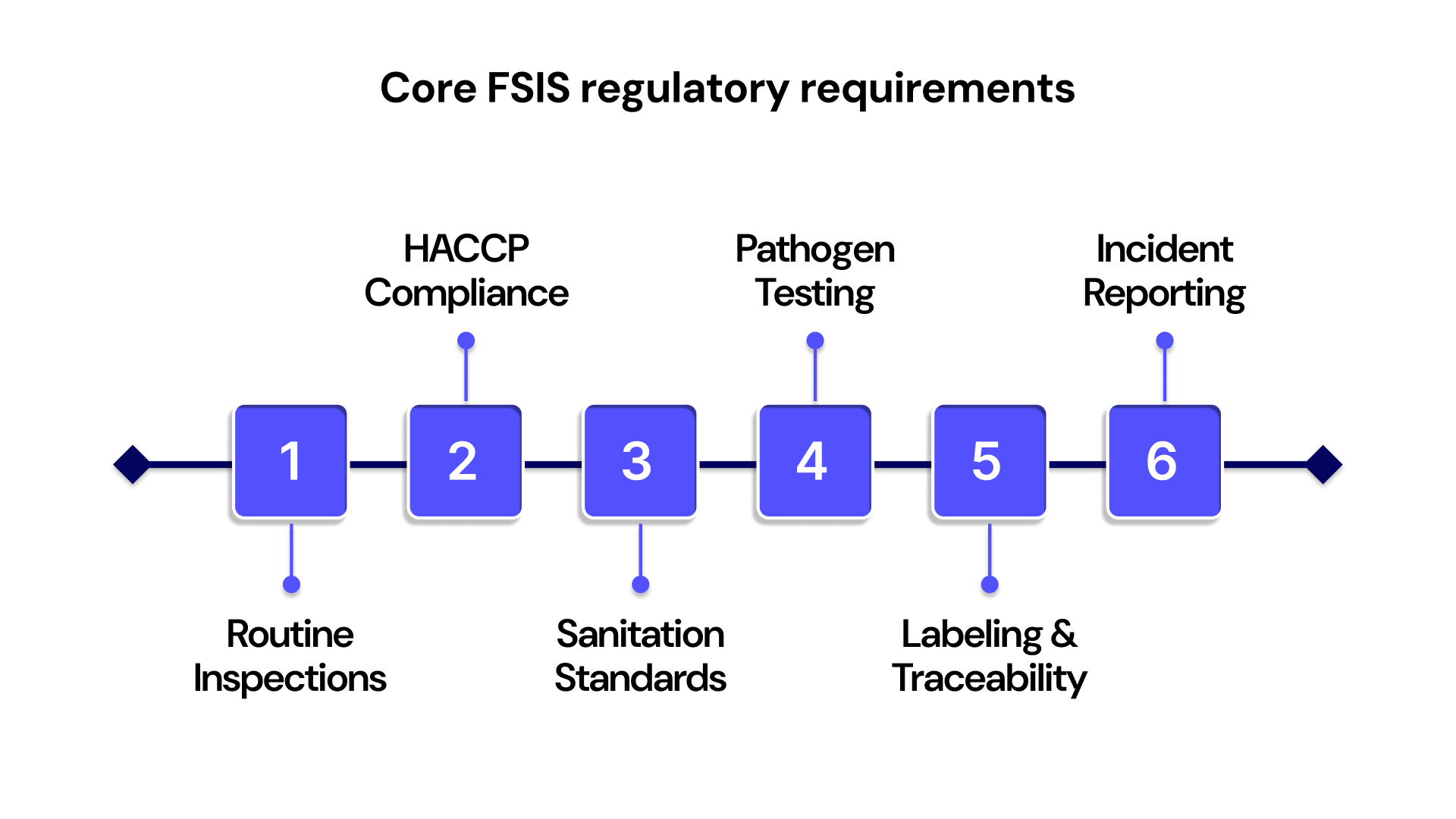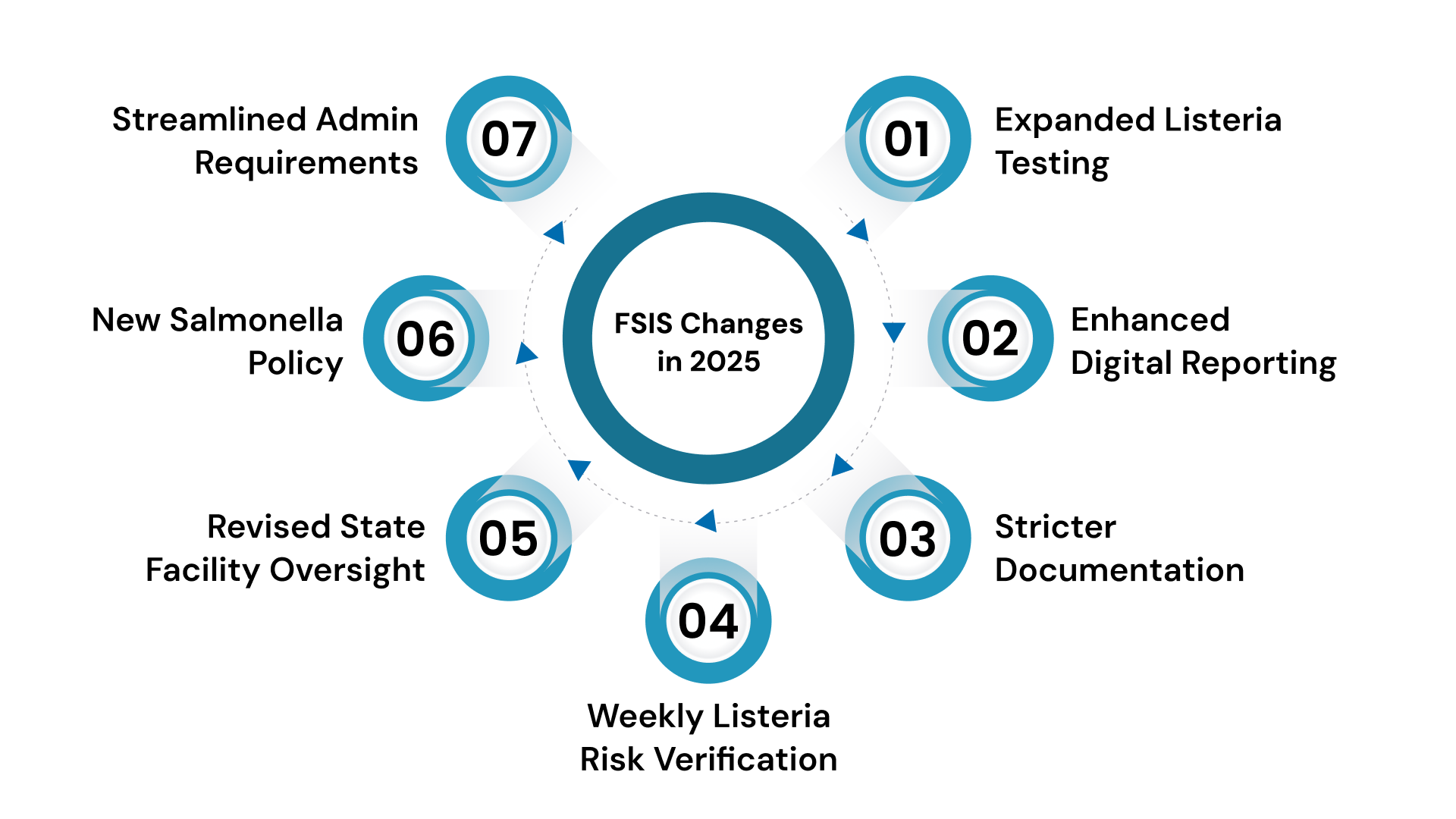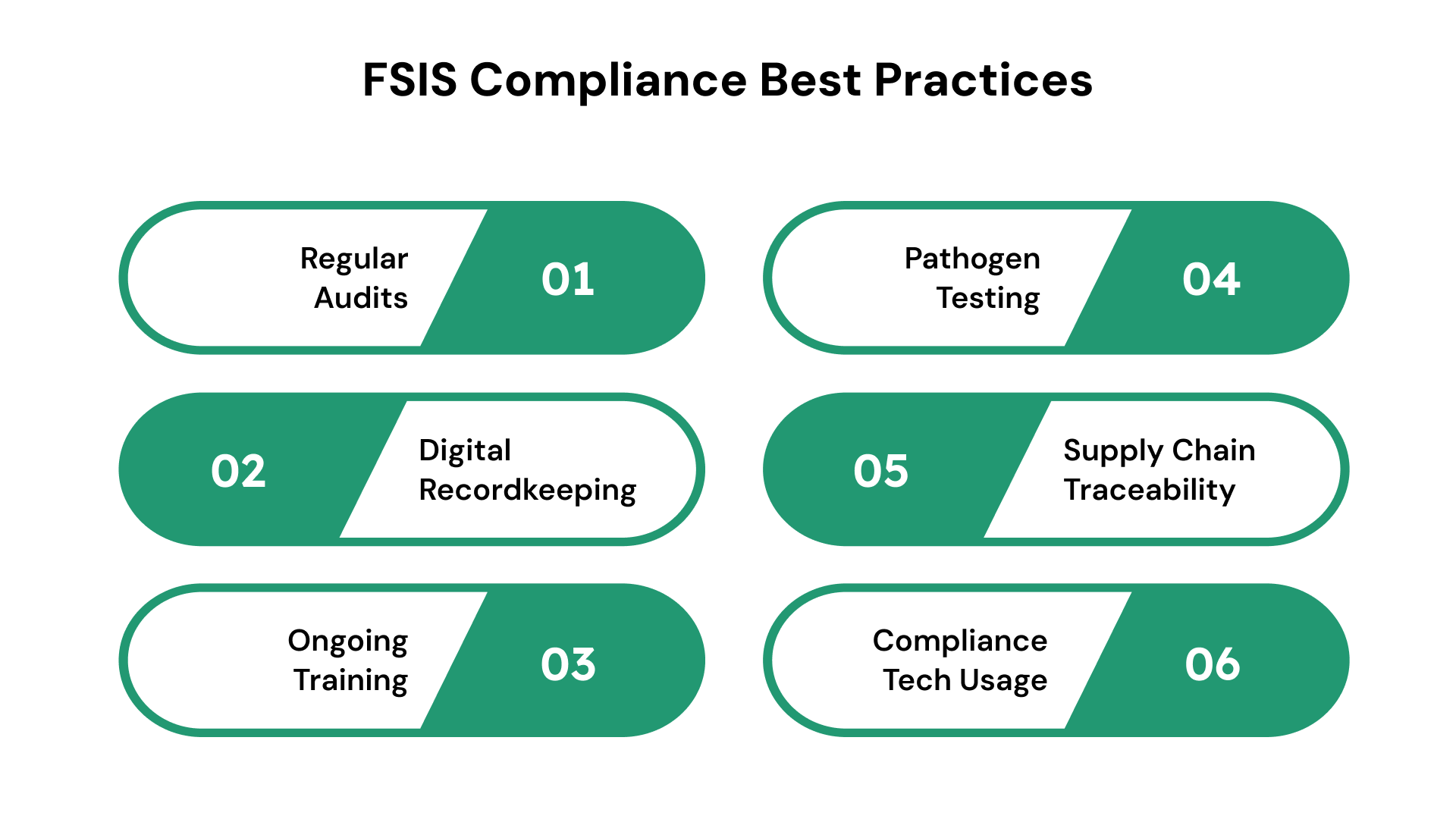FSIS Compliance in 2025: Streamlining Food Safety with Modern Solution
FSIS compliance is all about following the rules set by the U.S. Department of Agriculture’s Food Safety and Inspection Service (FSIS) to make sure meat, poultry, and egg products are safe and properly labeled. The FSIS oversees everything from production and packaging to sanitation and recordkeeping, guided by laws like the Federal Meat Inspection Act and the Poultry Products Inspection Act. Essentially, it’s about making sure food businesses meet federal standards to keep products safe for consumers.

In the US, the Food Safety and Inspection Service (FSIS) sets strict standards to keep meat, poultry, and egg products safe for consumers. For food manufacturers and processors, staying compliant isn’t optional. It’s essential to avoid costly penalties, protect your brand, and ensure public health. But with changing regulations and increasing documentation demands, managing FSIS compliance can quickly become overwhelming.
Key Takeaways (TL;DR)
This blog explains what FSIS compliance means in 2025 and shows how modern tools can help you stay ahead, simplify processes, and reduce risk.
- FSIS compliance in 2025 demands stricter documentation, inspections, and pathogen testing, especially for Listeria and Salmonella.
- Manual systems no longer meet FSIS expectations. Digital records and real-time visibility are essential for audit readiness.
- Facilities must stay prepared for weekly inspections, expanded testing, and tighter enforcement on risk controls.
- Multi-site operations face higher compliance risks without standardized processes and clear oversight.
- Proactive audits, continuous training, and smart compliance tools are key to staying ahead of changing FSIS rules.
What is FSIS Compliance?
FSIS compliance refers to the set of regulatory requirements and operational standards that food businesses must meet under the oversight of the Food Safety and Inspection Service (FSIS), a public health agency within the U.S. Department of Agriculture (USDA). FSIS is responsible for ensuring that meat, poultry, and egg products distributed in the U.S. are safe, wholesome, and truthfully labeled.
Operating under federal mandates such as the Federal Meat Inspection Act (FMIA), Poultry Products Inspection Act (PPIA), and Egg Products Inspection Act (EPIA), FSIS oversees a comprehensive compliance framework that spans across production, packaging, labeling, sanitation, and recordkeeping.
FSIS compliance Involves:
- Inspection: Daily oversight of slaughterhouses, processing plants, and import facilities to ensure adherence to food safety and hygiene standards.
- Enforcement: Issuing citations, initiating recalls, or suspending operations when violations are found.
- Public Health Protection: Developing science-based regulations and responding quickly to outbreaks, contamination events, and mislabeling incidents.
Meeting FSIS compliance means implementing structured programs like HACCP (Hazard Analysis and Critical Control Points), SSOPs (Sanitation Standard Operating Procedures), and maintaining detailed, traceable records to demonstrate ongoing control over food safety hazards.
FSIS Regulatory Compliance Requirements
FSIS regulatory requirements have evolved significantly in recent years, with 2025 bringing new expectations for food manufacturers, processors, and distributors.
Core FSIS regulatory requirements include:

- Routine Inspections: FSIS inspectors are present in all federally regulated facilities, conducting daily inspections to verify compliance with food safety standards.
- Hazard Analysis and Critical Control Points (HACCP): Facilities must implement HACCP systems to identify, monitor, and control food safety hazards throughout production.
- Sanitation Standards: Strict sanitation protocols are required, including regular cleaning, environmental monitoring, and documentation of all procedures.
- Pathogen Testing: Facilities must routinely test for pathogens such as Salmonella and Listeria monocytogenes, taking corrective action when necessary.
- Labeling and Traceability: All products must be accurately labeled, and facilities must maintain detailed records to ensure traceability in the event of a recall.
- Incident Reporting: Any contamination, mislabeling, or foodborne illness incidents must be promptly reported to FSIS for investigation and public notification.
Also read: Understanding the Importance and Types of Incident Reporting
FSIS Regulatory Requirements in 2025: What’s Changed?

In 2025, FSIS has introduced several significant updates to strengthen food safety oversight and address emerging risks:
- Expanded Listeria Testing: Effective January 2025, FSIS now conducts broader Listeria species testing on all samples of ready-to-eat products, as well as on environmental and food contact surfaces. This change aims to provide more comprehensive data on facility sanitation and help FSIS quickly identify when follow-up actions are needed.
- Enhanced Digital Reporting: FSIS now requires more robust digital recordkeeping and real-time reporting of inspections, corrective actions, and food safety incidents. Facilities must maintain electronic logs that can be quickly accessed during audits or investigations.
- Stricter Documentation Standards: There is an increased focus on comprehensive documentation for every stage of production, including hazard analysis, critical control points, and corrective actions. FSIS inspectors are emphasizing the need for clear, auditable records that demonstrate ongoing compliance.
- Weekly Verification of Listeria Risk Factors: FSIS inspectors now verify specific Listeria-related risk factors at ready-to-eat facilities every week. This includes monitoring for plant modifications, sanitation issues, and positive test results for Listeria species or monocytogenes.
- Revised Oversight of State-Inspected Facilities: FSIS has clarified requirements and updated cooperative agreements with state agencies to ensure consistent oversight and training for facilities operating under Talmadge-Aiken programs.
- New Salmonella Policy: In April 2024, FSIS finalized a policy declaring Salmonella an adulterant in raw breaded stuffed chicken products when contamination exceeds a specific threshold. This allows FSIS to stop the sale of products with unsafe Salmonella levels and is part of a broader effort to reduce foodborne illness risks.
- Streamlined Administrative Requirements: In March 2025, FSIS announced the elimination of outdated administrative requirements for pork and poultry industries, including extending waivers for higher line speeds and removing redundant worker safety data submissions. These reforms aim to improve efficiency while maintaining rigorous food safety standards.
These 2025 updates reflect FSIS’s commitment to leveraging science, technology, and data-driven oversight to further protect public health and ensure the integrity of the US food supply.
As these new rules take effect, many businesses are encountering fresh challenges in their efforts to maintain compliance.
Top FSIS Compliance Challenges for US Organizations
Complying with FSIS regulations is complex and demanding. Food manufacturers, processors, and distributors often encounter these critical challenges:
- Navigating Frequent and Complex Regulatory Changes: FSIS updates policies regularly such as new pathogen testing protocols and labeling requirements making it difficult for organizations to stay current and fully compliant without dedicated resources.
- Maintaining Comprehensive and Accurate Documentation: FSIS requires detailed records of inspections, sanitation procedures, corrective actions, and traceability. Incomplete or inconsistent documentation can lead to audit failures, product recalls, or enforcement actions.
- Ensuring Effective Pathogen Control and Environmental Monitoring: Controlling pathogens like Listeria monocytogenes and Salmonella is a persistent challenge. Facilities must implement rigorous environmental monitoring programs and respond swiftly to positive test results to prevent contamination.
- Coordinating Compliance Across Multiple Facilities and Supply Chains: Large organizations with multiple plants or complex supply chains struggle to enforce standardized processes and maintain uniform compliance, increasing the risk of gaps or inconsistencies.
- Responding Quickly to FSIS Inspections and Non-Compliance Findings: FSIS inspections are frequent and thorough, and non-compliance can trigger immediate corrective actions or even product recalls. Organizations must have systems in place for rapid response to minimize disruption.
Fortunately, there are proven strategies that can help organizations overcome these hurdles and strengthen their compliance programs.
Industry Best Practices for FSIS Compliance

With FSIS regulations tightening in 2025 especially around pathogen control, digital recordkeeping, and inspection readiness. US food businesses must adopt proven strategies to maintain compliance and minimize risk. The following best practices are endorsed by food safety experts and align with current FSIS priorities:
- Regular Internal Audits: Conduct frequent, in-depth reviews of food safety systems, including sanitation procedures, HACCP plans, and documentation. These audits help identify gaps and ensure readiness for FSIS Food Safety Assessments, which are now prioritized at ready-to-eat facilities relying on sanitation measures for Listeria control.
- Comprehensive Digital Recordkeeping: Maintain detailed, accessible electronic records of inspections, testing, corrective actions, and sanitation logs. Enhanced digital documentation is essential for meeting FSIS’s updated standards and supports rapid response during audits or investigations.
- Ongoing Staff Training: Invest in regular training for employees on the latest FSIS requirements, including new protocols for Listeria and Salmonella control. In 2025, FSIS inspectors themselves are receiving updated training and tools to better identify systemic food safety issues, and your workforce should be equally prepared.
- Proactive Pathogen Testing and Environmental Monitoring: Increase the frequency and scope of testing for Listeria and Salmonella, especially in ready-to-eat areas. FSIS now requires broader Listeria species testing and weekly verification of risk factors at high-risk facilities.
- Supply Chain Traceability: Collaborate with suppliers and distributors to ensure full traceability across the food supply chain. This is critical for compliance with both FSIS and new FDA traceability rules coming into effect.
- Use Technology for Compliance Management: Use advanced food safety and compliance management platforms to automate documentation, streamline reporting, and monitor compliance status in real time. This approach reduces manual errors and ensures that your organization can quickly adapt to regulatory changes.
Also read: Best GRC Tool for Food and Beverage Manufacturing in the US
By implementing these best practices, organizations can strengthen their FSIS compliance posture, reduce the risk of enforcement actions, and protect both consumers and their brand reputation.
Adopting these best practices is a strong foundation, but leveraging the right technology can take FSIS compliance to the next level.
How VComply Simplifies FSIS Compliance
FSIS enforcement actions are becoming increasingly data-driven and stringent, with the agency issuing NoncomplianceRecords (NRs), civil penalties, and even suspending operations for facilities that fail to meet regulatory standards.
VComply’s ComplianceOps platform directly addresses these evolving FSIS compliance challenges by:
- Automated compliance task assignments and reminders: Ensures all FSIS-required inspections, sanitation checks, and corrective actions are scheduled, tracked, and completed on time, reducing the risk of missed steps and enforcement actions.
- Centralized documentation and digital audit trails: Stores all compliance activities, records, and corrective actions in a secure, searchable platform, making it easy to retrieve documentation during FSIS audits or investigations.
- Real-time dashboards for compliance status: Provides instant visibility into compliance metrics across multiple facilities, helping organizations spot and resolve potential issues before they escalate.
- Policy management for SOP distribution and acknowledgment: Streamlines the updating and distribution of standard operating procedures (SOPs), ensuring all staff are informed and trained on the latest FSIS requirements.
By integrating ComplianceOps, organizations can move from reactive compliance to a proactive, transparent, and auditable approach, ensuring they meet FSIS’s heightened standards in 2025 and beyond.
Wrapping Up
FSIS compliance in 2025 demands greater vigilance, transparency, and agility from food businesses. With stricter enforcement, expanded testing requirements, and increased digital oversight, organizations must move beyond reactive approaches to build proactive, efficient compliance programs. Failure to meet FSIS standards can result in serious consequences from costly penalties to operational shutdowns—that impact both your bottom line and brand reputation.
With VComply’s ComplianceOps, you can simplify complex regulatory requirements, automate critical tasks, and maintain complete, audit-ready documentation. This empowers your team to stay ahead of FSIS updates, respond swiftly to issues, and ensure consistent food safety across all locations.
Take control of your FSIS compliance journey today, streamline your processes, reduce risk, and protect your business with ComplianceOps. Schedule a free demo today.
FAQs
1. How often does FSIS update its food safety regulations?
FSIS regularly reviews and updates its regulations to address emerging risks and scientific advancements. Major updates, such as new testing protocols or labeling requirements, are often communicated through annual plans, constituent updates, and rulemaking notices.
2. What happens if a facility fails to comply with FSIS regulations?
Noncompliance can result in enforcement actions such as Noncompliance Records (NRs), product recalls, civil penalties, suspension of inspection services, or even facility closure in severe cases.
3. What are the major FSIS regulatory changes in 2025?
In 2025, FSIS expanded Listeria species testing in ready-to-eat products, enhanced inspector training, prioritized Food Safety Assessments at high-risk facilities, and implemented stricter oversight of Salmonella in breaded and stuffed chicken products. There are also updates to allergen labeling and new compliance dates for labeling rules.
4. How can food businesses prepare for FSIS inspections and compliance in 2025?
Best practices include maintaining comprehensive digital records, conducting regular internal audits, staying current with FSIS updates, providing ongoing staff training, and using technology solutions for compliance management.
5. When do new FSIS labeling regulations take effect?
FSIS has set January 1, 2028, as the uniform compliance date for new meat and poultry product labeling regulations published between January 1, 2025, and December 31, 2026. This gives producers time to update labels and comply with new requirements.

